
Amazon Prime Free Trial
FREE Delivery is available to Prime members. To join, select "Try Amazon Prime and start saving today with FREE Delivery" below the Add to Cart button and confirm your Prime free trial.
Amazon Prime members enjoy:- Cardmembers earn 5% Back at Amazon.com with a Prime Credit Card.
- Unlimited FREE Prime delivery
- Streaming of thousands of movies and TV shows with limited ads on Prime Video.
- A Kindle book to borrow for free each month - with no due dates
- Listen to over 2 million songs and hundreds of playlists
Important: Your credit card will NOT be charged when you start your free trial or if you cancel during the trial period. If you're happy with Amazon Prime, do nothing. At the end of the free trial, your membership will automatically upgrade to a monthly membership.
Buy new:
-35% $12.98$12.98
Ships from: Amazon.com Sold by: Amazon.com
Save with Used - Good
$8.90$8.90
Ships from: Amazon Sold by: ZBK Wholesale

Download the free Kindle app and start reading Kindle books instantly on your smartphone, tablet, or computer - no Kindle device required.
Read instantly on your browser with Kindle for Web.
Using your mobile phone camera - scan the code below and download the Kindle app.



 Audible sample
Audible sample Where Is God When It Hurts?: Your Pain Is Real . . . When Will It End? Paperback – March 1, 2002
Purchase options and add-ons
Gold Medallion Book Award Winner. Over a million copies sold.
An inspirational classic for more than thirty years,?Where Is God When It Hurts??honestly explores pain—from physical wounds to emotional and spiritual pain—and sheds new light on God's presence in our suffering.
"How can a loving God allow this to happen? God is either all-loving or all-powerful, but he can't be both."
You've heard that question, and perhaps you've even asked it yourself. When a loved one dies, we receive a terminal diagnosis, or natural disasters strike, people often wonder whether God is the?cause?of suffering and why he doesn't immediately take away the pain or fix the situation. As a result, we become angry at the once-beloved God who betrayed us.
Bestselling author Philip Yancey uses examples from the Bible and from his own experiences to show us how we can learn to accept—without blame, anger, or fear—what we don't understand. Along the way, he answers questions such as:
- Why is there such a thing as pain?
- Is pain a message from God?
- How should we respond to suffering?
- How can we learn to cope with pain?
Where Is God When It Hurts??speaks to everyone who thinks that suffering doesn't make sense. With compassion and clarity, Yancey brings us one step closer to finding an answer when our pain, or the pain of those we love, is real and we are left wondering,?where is God when it hurts?
"One of the most helpful treatments of the problem of evil that I've ever read. If I were looking around for something to give to individuals who are going through travail or difficulty, this is the book I'd recommend." —Dr. Vernon Grounds, former Chancellor of Denver Seminar
- Print length288 pages
- LanguageEnglish
- PublisherZondervan
- Publication dateMarch 1, 2002
- Dimensions5.56 x 0.78 x 8.51 inches
- ISBN-100310245729
- ISBN-13978-0310245728
Book recommendations, author interviews, editors' picks, and more. Read it now

Explore your book, then jump right back to where you left off with Page Flip.
View high quality images that let you zoom in to take a closer look.
Enjoy features only possible in digital – start reading right away, carry your library with you, adjust the font, create shareable notes and highlights, and more.
Discover additional details about the events, people, and places in your book, with Wikipedia integration.
Frequently bought together

More items to explore
From the brand

Resources by Philip Yancey
Scroll right to see Philip Yancey’s most popular books, video studies, and to visit the store.
-
Books
-
Video Studies
-
Who Is Philip Yancey?
Philip is a bestselling author who has written twelve award–winning books and won two ECPA Book of the Year awards. Four of his books have sold over one million copies. In 1992 he and his wife Janet moved to the foothills of Colorado, where they currently reside.
What Is Philip’s Passion?
Philip explores the most basic questions and deepest mysteries of the Christian faith.
How Did Philip Get His Start?
Philip worked as a journalist in Chicago for some twenty years, editing the youth magazine Campus Life while also writing for a wide variety of magazines.
From the Publisher


A Problem That Won’t Go Away
Many suffering people want to love God, but cannot see past their tears. They feel hurt and betrayed. Sadly, the church often responds with more confusion than comfort.
At an age when I had no right to tackle the daunting problem of pain, I wrote Where Is God When It Hurts? for those people. Partly because I have heard from so many of them, I have now revised and expanded this book. In a sense, this new edition represents a dialogue with my readers, the next step in my own pilgrimage.
I have especially expanded the section “How Can We Cope with Pain?” because I believe God has given the church a mandate of representing his love to a suffering world. We usually think of the problem of pain as a question we ask of God, but it is also a question he asks of us. How do we respond to hurting people?
—Philip Yancey

Part 1: Why Is There Such a Thing as Pain?

Part 2: Is Pain a Message from God?

Part 3: How People Respond to Suffering

Part 4: How Can We Cope with Pain?

Part 5: How Does Faith Help?
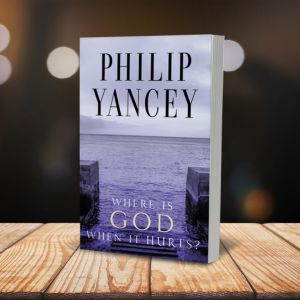
“One of the most helpful treatments of the problem of evil that I’ve ever read ... on a level that really speaks to people.”
—Dr. Vernon Grounds, former Chancellor of Denver Seminary

What’s So Amazing About Grace?
|
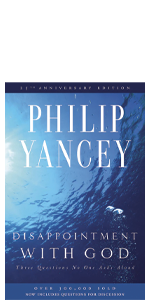
Disappointment with God: Three Questions No One Asks Aloud
|
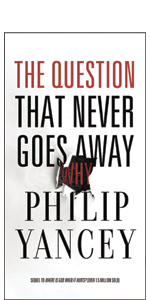
The question that Never Goes Away
|

Grace Notes: 366 Daily Inspirations from a Fellow Pilgrim
|
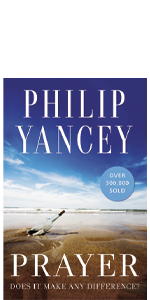
Prayer: Does it make any difference?
|
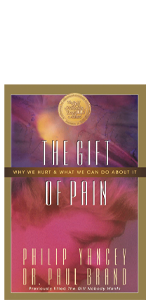
The Gift of Pain: Why We Hurt and What We Can Do About It
|
|
|---|---|---|---|---|---|---|
| Customer Reviews |
4.8 out of 5 stars 1,131
|
4.6 out of 5 stars 1,354
|
4.6 out of 5 stars 481
|
4.7 out of 5 stars 409
|
4.6 out of 5 stars 1,104
|
4.8 out of 5 stars 411
|
| Price | $15.32$15.32 | $14.43$14.43 | $10.86$10.86 | $15.64$15.64 | $15.82$15.82 | $14.66$14.66 |
| More Exceptional Books by Philip Yancey | It's the most powerful force in the universe, our only hope for love and forgiveness, and a foretaste of eternal life: amazing, radical, life-changing grace. Over two million copies sold. | Many of us experience times when life with God seems to fall short of our expectations—when we feel let down by God, hurt, or abandoned. This is something most people don't talk about—until now. | Why does God allow suffering? In this sequel to Where Is God When It Hurts?, Yancey revisits our cry of "Why, God?" in the wake of increased violence and natural disasters the world over. | These meditations—all drawn from the beloved and bestselling writings of the author—will take you through an entire year of Yancey's insight and imagination, covering a broad range of topics. | Philip Yancey probes the very heartbeat of our relationship with God: prayer. What is prayer? Does it change God's mind or ours or both? This book is an invitation to communicate with God the Father who invites us into an eternal partnership. | Pain is not something that most of us would count as a blessing; however, renowned surgeon Dr. Paul Brand and award-winning writer Philip Yancey shed fresh light on the purpose of our pain. |
Editorial Reviews
Review
From the Back Cover
You've heard that question, perhaps asked it yourself. No matter how you complete it, at its root lies the issue of pain.
Does God order our suffering? Does he decree an abusive childhood, orchestrate a jet crash, steer a tornado through a community? Or did he simply wind up the world's mainspring and now is watching from a distance?
In this Gold Medallion Award-winning book, Philip Yancey reveals a God who is neither capricious nor unconcerned. Using examples from the Bible and from his own experiences, Yancey looks at pain--physical, emotional, and spiritual--and helps us understand why we suffer. Where Is God When It Hurts? will speak to those for whom life sometimes just doesn't make sense. And it will help equip anyone who wants to reach out to someone in pain but just doesn't know what to say.
About the Author
Philip Yancey previously served as editor-at-large for Christianity Today magazine. He has written thirteen Gold Medallion Award-winning books and won two ECPA Book of the Year awards, for What's So Amazing About Grace? and The Jesus I Never Knew. Four of his books have sold over one million copies. He lives with his wife in Colorado. Learn more at philipyancey.com.
Excerpt. © Reprinted by permission. All rights reserved.
Product details
- Publisher : Zondervan; Anniversary edition (March 1, 2002)
- Language : English
- Paperback : 288 pages
- ISBN-10 : 0310245729
- ISBN-13 : 978-0310245728
- Item Weight : 2.31 pounds
- Dimensions : 5.56 x 0.78 x 8.51 inches
- Best Sellers Rank: #48,135 in Books (See Top 100 in Books)
- #711 in Christian Personal Growth
- #731 in Christian Inspirational
- #1,576 in Christian Spiritual Growth (Books)
- Customer Reviews:
About the author

I started my career working as an Editor and then Publisher for Campus Life magazine. During those ten years I learned journalistic skills (there's no tougher audience than teenagers), but every year it seemed I wrote fewer and fewer words. In 1980 my wife and I moved to downtown Chicago where I began a career as a freelance writer. (She has worked as a social worker and hospice chaplain--which gives me plenty of material to write about!) We lived there until 1992, when we moved to the foothills of Colorado.
I've written over 30 books, most of them still in print, thankfully. Three of them I coauthored with Dr. Paul Brand, who influenced me more than any single person. A recent book, "Fearfully and Wonderfully: The Marvel of Bearing God's Image" is a revised compilation of that content. My other favorites include "Soul Survivor" and "Reaching for the Invisible God" because both of them forced me to dig deep and get personal.
I had two new books released in 2021. “A Companion in Crisis” offers a paraphrase of John Donne’s ‘Devotions’ with commentary and application to our current suffering. My long-awaited memoir, “Where the Light Fell” gives readers a backstory of sorts, revealing the secrets of my turbulent childhood and teen years, and the impact on my written work.
I'm a pilgrim, still 'in recovery' from a bad church upbringing, searching for the possibility of a faith rooted in grace instead of fear. I feel overwhelming gratitude that I can make a living writing about the questions that interest me.
Official Facebook page: www.facebook.com/PhilipYancey
More details, including blog entries, book sales, and release notices: philipyancey.com
SUBSCRIBE to my monthly blog: https://bit.ly/PhilipYanceyBlog
Customer reviews
Customer Reviews, including Product Star Ratings help customers to learn more about the product and decide whether it is the right product for them.
To calculate the overall star rating and percentage breakdown by star, we don’t use a simple average. Instead, our system considers things like how recent a review is and if the reviewer bought the item on Amazon. It also analyzed reviews to verify trustworthiness.
Learn more how customers reviews work on AmazonCustomers say
Customers find this book well-written and easy to understand, helping them see the meaning of pain and suffering while giving permission to feel it. Moreover, the book explores situations thoroughly with engaging stories and challenging discussion questions, while maintaining a love of God throughout. Additionally, customers appreciate its conversational style, with one noting it's excellent for small group discussions.
AI-generated from the text of customer reviews
Select to learn more
Customers find the book highly readable, describing it as a fascinating and wonderful read, with one customer noting it as the best book on theodicy.
"...make up his case that God is, in fact, both all-loving and all-powerful. So, how does he make this case? Slowly and deliberately...." Read more
"What an amazing book. The way the author navigates this subject was fascinating...." Read more
"...Philip Yancey does a wonderful job of explaining pain and uplifting readers. He is a Christian author, and excels at encouraging other Christians...." Read more
"One of the best books I've read on pain and suffering. Yancey begins by showing the importance and benefit of pain...." Read more
Customers find the book enlightening, helping them understand the meaning of pain and suffering, and giving them permission to feel it.
"...There's a great deal of very practical advice here and Yancey steers us away from some of the common errors that Christians make when interacting..." Read more
"...me with a new perspective into the area of suffering, discomfort and pain. An insight that has helped me in such a profound way...." Read more
"...Philip Yancey does a wonderful job of explaining pain and uplifting readers. He is a Christian author, and excels at encouraging other Christians...." Read more
"...The author then shows that God understands and cares deeply about our pain. Jesus Himself suffered more than we ever will...." Read more
Customers praise the writing style of the book, noting that it is well-explained, easy to read and understand, and written in a candid, down-to-earth manner.
"...It is easy to follow, makes sense, and is very meaningful. Yancey also uses a vast amount of examples in this book...." Read more
"...What a great writer!" Read more
"In the first place, Yancey is a gifted wordsmith. His prose grips; he ought to try novels...." Read more
"this book by Philip Yancey is amazing in the clarity and depth of the writing...." Read more
Customers appreciate the depth of the book, with engaging stories and challenging discussion questions throughout. One customer notes how it explores each situation thoroughly, while another highlights its combination of experiences and interviews.
"...Part 3 recounts the stories of several suffering people. One chapter is devoted to Brian Sternberg. Another tells about Joni Eareckson Tada...." Read more
"...The transparency of the stories was an absolute breath taking aid that added so such value to the storyline...." Read more
"...He uses good research and utilizes relatable stories that readers can easily learn from and understand while being able to apply quality lessons to..." Read more
"...Yancy interviews and carefully constructs details for incidents that follow his outline...." Read more
Customers appreciate the book's faith-based content, noting that God is never absent from our lives and is biblically grounded, with one customer describing it as an excellent apologetic for belief in God.
"...and persevering make up his case that God is, in fact, both all-loving and all-powerful. So, how does he make this case?..." Read more
"...that can not only bring about healing, but help others and glorify God...." Read more
"...He does cover all the essential theological responses to the problem of evil, however, so It's not just a feel-good fantasy based in..." Read more
"...It is well supported by scripture while written in a style that projects information that sticks with a person...." Read more
Customers find the book insightful, with one customer noting its fair and sensitive approach to the difficult topic, while another appreciates its intellectual rather than emotional perspective.
"...The outline is outstanding. I read it when it first came out, and this is the revised edition...." Read more
"...writes on the issues that we all think about with wisdom, mercy and grace that always leads us to the truth and hope we have in Jesus." Read more
"...seeing the questions answered that are brought up in this book is good self-care and self-love...." Read more
"...Insightful look into things we take for granted. Really wish there was a required High School course on something like this topic." Read more
Customers appreciate the conversational style of the book, with one mentioning it's excellent for small group discussions and another noting how it influenced conversations with children.
"...It has influenced my conversations with my children in their life decisions, and has influenced my attitude in my profession...." Read more
"...in multiple sources and types of sources to give the reader a good engagement of the issue of pain and suffering and faithful response...." Read more
"...Appreciated that he interviewed folks and got their views...." Read more
"...It is very conversational and very down to earth...." Read more
Reviews with images
A Valuable Resource for Hurting People - and Those Who Minister to Them
Top reviews from the United States
There was a problem filtering reviews. Please reload the page.
- Reviewed in the United States on April 21, 2017One of the biggest objections that people have to the idea of a loving God, is the reality of pain and suffering in the world. They ask, "How can a loving God allow this or that to happen?"
"Either God is all-powerful," the argument goes, "or he is all-loving. But the state of our world is evidence that he cannot possibly be both."
Or can he be?
Christians have - since the beginning - thought about this important question. It's a question we can't escape. It is all around us. Every time a loved one dies, we're faced with it. Every terminal diagnosis we hear about reminds us of it. And when we turn on the news, there's a near constant stream of reasons to question God's love and power.
And not only is this question all around us - it's incredibly personal. This isn't a subject only for theologians in their ivory towers. The question of suffering will touch every human being on earth, given enough time.
So, where is God in the midst of all this?
That's what Philip Yancey attempts to answer in his classic book Where is God When it Hurts? Originally written in 1977 when Yancey was in his mid-twenties, it went through a major revision in 1990 (I can't speak to any differences between the two versions because I've only read the more recent one). And though he was young when he first put pen to paper, this book is filled with wisdom. Wisdom gained by listening to others.
One of the things I learned fairly early on in my life, was that even if I didn't have wisdom or understanding. Others did. And if I'm willing to listen to their stories, their experiences, and their failures, then I don't have to make the same mistakes they did. I can glean from the wisdom of others. This is how Yancey was able - though young - to write a book that's so seasoned.
As a journalist, Yancey had the opportunity to interview people from all walks of life. Their stories of suffering and persevering make up his case that God is, in fact, both all-loving and all-powerful. So, how does he make this case? Slowly and deliberately.
The book is divided up into five parts that build on one another. He begins with the rather broad question, 'Why is there such a thing as pain?' This is as foundational as you can get. And I can imagine that many people who are suffering - whether from physical or psychological pain - might ask this question: "If God is good, why did he create pain to begin with?"
What follows is a rather clinical discussion - focusing on the biology of pain and how our body processes it. It makes sense to me, in a theoretical way, to begin a book like this. But as I read, I wondered about the person reading this who had just lost their spouse - or who had just received a terminal diagnosis. I almost felt like they might be turned off by this approach. And Yancey acknowledges that, even when we understand the purpose of pain, it doesn't help those who experience it in its chronic form. Again, I get why he started this way. It makes sense because of everything he builds on this foundation. I just wonder how many suffering people started reading Where is God When it Hurts? - in hopes of finding help - but quickly put it down because of the way it began.
As Yancey continues, he tells about Dr. Paul Brand, a doctor who works with lepers in Louisiana. Lepers' pain receptors don't work. They can't experience pain - at least not the physical kind. And it's disastrous for them. They don't know when something is too hot, so they can easily burn themselves. They can break bones, tear tendons, and cut themselves without even realizing it.
Though we might wish we could experience a pain-free life, we wouldn't like it if that wish was granted. We'd end up like old King Midas: realizing that the thing we thought we most wanted was actually the thing that would destroy us.
In part 2, Yancey asks another important question, 'Is pain a message from God?' He acknowledges the places in Scripture where suffering is sent by God but he makes an important distinction. When God sent judgment in the Old Testament, it was always preceded by a warning. In other words, God didn't send plagues or war or famine without first telling people he was going to. God always warned people - in hopes that they would repent.
Unfortunately, too many Christians strip these verses of their context and make proclamations about this or that being 'God's will.' But, we can't know that. God may allow a sickness or a death but that doesn't mean he caused it. Job's story reminds us that we can't know why most suffering takes place. And Yancey makes liberal use of Job's experience to excellent effect.
At the end of this section, Yancey argues that the Christian response to suffering must be just that: a response. If we focus on the cause, we'll never get out of the valley. If we keep asking "Why me?" or "What is God trying to tell me in this?" we'll just dig ourselves deeper into the ground. Instead of focusing on the cause, Yancey encourages us to keep our eyes facing forward. We should reflect on our response to the suffering more than the causes. This is the best way to work through the many emotions that accompany pain.
Part 3 recounts the stories of several suffering people. One chapter is devoted to Brian Sternberg. Another tells about Joni Eareckson Tada. And still another focuses on several Holocaust survivors. Each of these chapters looks at how people get through suffering - even when the suffering doesn't end. These are helpful because they bring much of what Yancey has been discussing down to an even more personal level. It's one thing to say "Focus on your response to pain rather than the cause." It's a completely different thing to hear about men like Christian Reger - a Holocaust survivor who persevered in spite of witnessing the very worst of humanity.
In part 4, Yancey gets practical by examining the question, 'How can we cope with pain?' Here, he looks at two things that will drag us into further pain (fear and helplessness) and two things that have the potential to lift us out of our pain (meaning and hope). These are important chapters though I felt like they'd probably be better for people ministering to others who are suffering rather than the suffering people themselves.
And since I'm on the subject, let me say that I believe this book would serve as a wonderful resource for pastors and for teams devoted to ministering to others. There's a great deal of very practical advice here and Yancey steers us away from some of the common errors that Christians make when interacting with suffering people. In addition, this book includes a group discussion guide in the back that would be perfect for either a ministry team or a support group to work through. I can imagine that it would be very profitable; though I can't speak from experience since I read it alone.
Yancey closes the book with, in my view, the most important part of all: 'How does faith help?' And in particular, he looks at how Christian faith helps. In this section, he notes the importance of the Church being Christ's presence and voice to suffering people. Pain can block out the voice of God. In those moments, the Church needs desperately to step up to the plate.
The end of this book returns to the question posed in the title, Where is God When it Hurts? If we're tempted to ask this question, we would do well to meditate on a picture of the crucifixion.
Jesus, God the Son, suffered alongside us. He entered into this world - a world he made - so that he could fully identify with us - his creatures. And when we suffer, we should remind ourselves that we don't suffer alone. God has suffered with us. He has come into our pain and our sorrow. As John's Gospel says, "Jesus wept" ( John 11:35).
And he weeps with us.
Because this world doesn't work the way he intended. Death and disease were not part of God's good creation. They are intruders and enemies.
And Jesus' resurrection reminds us that they won't have the final say. On Easter, Christ defeated death, once for all. This is the hope that sustains us through all pain and all suffering.
It's the hope that one day God will put all things right. In that day, God "will wipe away every tear from their eyes; and there will no longer be any death; there will no longer be any mourning, or crying, or pain; the first things have passed away" (Revelation 21:4). Yancey points us toward that day.
May we walk to it, through both joy and suffering, with confidence.
 5.0 out of 5 starsOne of the biggest objections that people have to the idea of a loving God, is the reality of pain and suffering in the world. They ask, "How can a loving God allow this or that to happen?"
5.0 out of 5 starsOne of the biggest objections that people have to the idea of a loving God, is the reality of pain and suffering in the world. They ask, "How can a loving God allow this or that to happen?"A Valuable Resource for Hurting People - and Those Who Minister to Them
Reviewed in the United States on April 21, 2017
"Either God is all-powerful," the argument goes, "or he is all-loving. But the state of our world is evidence that he cannot possibly be both."
Or can he be?
Christians have - since the beginning - thought about this important question. It's a question we can't escape. It is all around us. Every time a loved one dies, we're faced with it. Every terminal diagnosis we hear about reminds us of it. And when we turn on the news, there's a near constant stream of reasons to question God's love and power.
And not only is this question all around us - it's incredibly personal. This isn't a subject only for theologians in their ivory towers. The question of suffering will touch every human being on earth, given enough time.
So, where is God in the midst of all this?
That's what Philip Yancey attempts to answer in his classic book Where is God When it Hurts? Originally written in 1977 when Yancey was in his mid-twenties, it went through a major revision in 1990 (I can't speak to any differences between the two versions because I've only read the more recent one). And though he was young when he first put pen to paper, this book is filled with wisdom. Wisdom gained by listening to others.
One of the things I learned fairly early on in my life, was that even if I didn't have wisdom or understanding. Others did. And if I'm willing to listen to their stories, their experiences, and their failures, then I don't have to make the same mistakes they did. I can glean from the wisdom of others. This is how Yancey was able - though young - to write a book that's so seasoned.
As a journalist, Yancey had the opportunity to interview people from all walks of life. Their stories of suffering and persevering make up his case that God is, in fact, both all-loving and all-powerful. So, how does he make this case? Slowly and deliberately.
The book is divided up into five parts that build on one another. He begins with the rather broad question, 'Why is there such a thing as pain?' This is as foundational as you can get. And I can imagine that many people who are suffering - whether from physical or psychological pain - might ask this question: "If God is good, why did he create pain to begin with?"
What follows is a rather clinical discussion - focusing on the biology of pain and how our body processes it. It makes sense to me, in a theoretical way, to begin a book like this. But as I read, I wondered about the person reading this who had just lost their spouse - or who had just received a terminal diagnosis. I almost felt like they might be turned off by this approach. And Yancey acknowledges that, even when we understand the purpose of pain, it doesn't help those who experience it in its chronic form. Again, I get why he started this way. It makes sense because of everything he builds on this foundation. I just wonder how many suffering people started reading Where is God When it Hurts? - in hopes of finding help - but quickly put it down because of the way it began.
As Yancey continues, he tells about Dr. Paul Brand, a doctor who works with lepers in Louisiana. Lepers' pain receptors don't work. They can't experience pain - at least not the physical kind. And it's disastrous for them. They don't know when something is too hot, so they can easily burn themselves. They can break bones, tear tendons, and cut themselves without even realizing it.
Though we might wish we could experience a pain-free life, we wouldn't like it if that wish was granted. We'd end up like old King Midas: realizing that the thing we thought we most wanted was actually the thing that would destroy us.
In part 2, Yancey asks another important question, 'Is pain a message from God?' He acknowledges the places in Scripture where suffering is sent by God but he makes an important distinction. When God sent judgment in the Old Testament, it was always preceded by a warning. In other words, God didn't send plagues or war or famine without first telling people he was going to. God always warned people - in hopes that they would repent.
Unfortunately, too many Christians strip these verses of their context and make proclamations about this or that being 'God's will.' But, we can't know that. God may allow a sickness or a death but that doesn't mean he caused it. Job's story reminds us that we can't know why most suffering takes place. And Yancey makes liberal use of Job's experience to excellent effect.
At the end of this section, Yancey argues that the Christian response to suffering must be just that: a response. If we focus on the cause, we'll never get out of the valley. If we keep asking "Why me?" or "What is God trying to tell me in this?" we'll just dig ourselves deeper into the ground. Instead of focusing on the cause, Yancey encourages us to keep our eyes facing forward. We should reflect on our response to the suffering more than the causes. This is the best way to work through the many emotions that accompany pain.
Part 3 recounts the stories of several suffering people. One chapter is devoted to Brian Sternberg. Another tells about Joni Eareckson Tada. And still another focuses on several Holocaust survivors. Each of these chapters looks at how people get through suffering - even when the suffering doesn't end. These are helpful because they bring much of what Yancey has been discussing down to an even more personal level. It's one thing to say "Focus on your response to pain rather than the cause." It's a completely different thing to hear about men like Christian Reger - a Holocaust survivor who persevered in spite of witnessing the very worst of humanity.
In part 4, Yancey gets practical by examining the question, 'How can we cope with pain?' Here, he looks at two things that will drag us into further pain (fear and helplessness) and two things that have the potential to lift us out of our pain (meaning and hope). These are important chapters though I felt like they'd probably be better for people ministering to others who are suffering rather than the suffering people themselves.
And since I'm on the subject, let me say that I believe this book would serve as a wonderful resource for pastors and for teams devoted to ministering to others. There's a great deal of very practical advice here and Yancey steers us away from some of the common errors that Christians make when interacting with suffering people. In addition, this book includes a group discussion guide in the back that would be perfect for either a ministry team or a support group to work through. I can imagine that it would be very profitable; though I can't speak from experience since I read it alone.
Yancey closes the book with, in my view, the most important part of all: 'How does faith help?' And in particular, he looks at how Christian faith helps. In this section, he notes the importance of the Church being Christ's presence and voice to suffering people. Pain can block out the voice of God. In those moments, the Church needs desperately to step up to the plate.
The end of this book returns to the question posed in the title, Where is God When it Hurts? If we're tempted to ask this question, we would do well to meditate on a picture of the crucifixion.
Jesus, God the Son, suffered alongside us. He entered into this world - a world he made - so that he could fully identify with us - his creatures. And when we suffer, we should remind ourselves that we don't suffer alone. God has suffered with us. He has come into our pain and our sorrow. As John's Gospel says, "Jesus wept" ( John 11:35).
And he weeps with us.
Because this world doesn't work the way he intended. Death and disease were not part of God's good creation. They are intruders and enemies.
And Jesus' resurrection reminds us that they won't have the final say. On Easter, Christ defeated death, once for all. This is the hope that sustains us through all pain and all suffering.
It's the hope that one day God will put all things right. In that day, God "will wipe away every tear from their eyes; and there will no longer be any death; there will no longer be any mourning, or crying, or pain; the first things have passed away" (Revelation 21:4). Yancey points us toward that day.
May we walk to it, through both joy and suffering, with confidence.
Images in this review
- Reviewed in the United States on October 25, 2024What an amazing book. The way the author navigates this subject was fascinating. The transparency of the stories was an absolute breath taking aid that added so such value to the storyline.
This book provided me with a new perspective into the area of suffering, discomfort and pain. An insight that has helped me in such a profound way.
Not to long ago had the privilege of reading a book entitled: The Heavenly Man. And as I was digesting the material I found myself getting angry with God because of all the suffering and pain this individual was enduring.
But now after finishing Where is God when it Hurts by Phillip Yancy, I’ve look at this subject through a different lens. Highly recommended reading. A superb book.
- Reviewed in the United States on December 6, 2011This book was originally published in 1977, and it has been re-published a few times since then. It is an excellent book that I would recommend to anyone looking for some quality reading. Every person must endure pain at some point in his or her life, and this book has the potential to be astoundingly helpful in difficult situations. Philip Yancey does a wonderful job of explaining pain and uplifting readers. He is a Christian author, and excels at encouraging other Christians. The book is divided into three different sections. First, Yancey discusses actual physical pain and its causes and possible purposes. The second part is about coping with pain, and the third part relates pain back to the Christian faith. I thoroughly enjoyed the way that the book is laid out. It is easy to follow, makes sense, and is very meaningful. Yancey also uses a vast amount of examples in this book. He uses good research and utilizes relatable stories that readers can easily learn from and understand while being able to apply quality lessons to their own lives. All of Yancey's points in this book are relevant and meaningful. The average price of this book is very reasonable and definitely worth the money!
Top reviews from other countries
-
 alexsandra G.Reviewed in Italy on April 10, 2022
alexsandra G.Reviewed in Italy on April 10, 20225.0 out of 5 stars Davvero un bellissimo libro!!!!!
Quante volte nei momenti difficile non ci siamo chiesti, Dov'è Dio quando tutto sembra andare male o quando stiamo male? Un bellissimo libro.
 daniellaReviewed in Australia on October 31, 2018
daniellaReviewed in Australia on October 31, 20185.0 out of 5 stars Great and inspiring.
Read three times already
-
 MeemaReviewed in Germany on December 9, 2021
MeemaReviewed in Germany on December 9, 20215.0 out of 5 stars Das beste Buch über das Thema Leid/ The best book about Suffering
Klare Lese-empfehlung. Seit über 10 Jahren als Mediziner immer noch mein Nummer 1 Empfehlung von Büchern über Leid. Tiefgründig, warm, klargeschrieben. Öffnet den Verstand und das Herz weiter über das Thema zu denken und nicht nur bei der Frage "Warum?" befangen zu bleiben sonder "Wozu?" kann das alles dienen. Und wo Gott (in Jesus) doch da ist, mitten im Leid.
A must read! Not just asking "Why" there is suffering but "to what end?" suffering can serve. Warmhearted, clear and practical. This book is still after over ten years as a doctor my Number one reccommendation for a book over suffering.
 A VMReviewed in India on August 12, 2014
A VMReviewed in India on August 12, 20145.0 out of 5 stars a must read for those who believe and yet are in pain.
Philip Yancey understands the heart of Christian Message. He has insights that helps a common person have a look into deep matters.
Excellent book
 Kindle CustomerReviewed in Singapore on October 3, 2024
Kindle CustomerReviewed in Singapore on October 3, 20245.0 out of 5 stars Highly recommend
Everyone should read this book






























